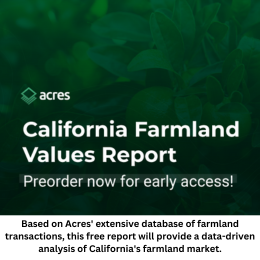June 14, 2016
Australian fund manager, Laguna Bay has had its first close of A$280 million ($208 million) from North American investors toward a targeted A$1 billion corpus for its Australian and New Zealand Agricultural Fund.
The fund has established a ten-year timeframe with a minimum investment requirement of $10 million, and has eliminated the possibility of investors having veto power over asset transactions, Laguna Bay co-founder and chief executive, Tim McGavin told The Australian.
Many institutional investors have taken a very conservative approach to directly buying agricultural assets in Australia because of nebulous regulations established by the Foreign Investment Review Board (FIRB), commodity price volatility, weather uncertainty, a lack of liquidity, and the need to secure competent farm managers. This fund will provide such investors, including European pension funds, a vehicle through which to gain exposure to the high potential within Australia’s ag sector.
“Australia is a major agricultural producer and exporter, and one of the world’s lowest cost producers in the key commodities we export… Yet it needs a significant amount of patient and aligned capital structured to suit agriculture. We believe the fund will be an important participant in Australian agriculture,” McGavin said in a company statement.
In addition to land appreciation over the long term, Mr. McGavin told The Australian that the fund is targeting a minimum 5% cash returns generated from operations on its portfolio of farms that will either be bought and leased to farmer-operators, directly owned and operated by the fund, or operated within a joint venture agreement with local farmers.
The fund’s farming assets will have a wide spread across crops, geography and water resources in order to reduce risk, with investments made into farms or clusters of farms involved in horticulture, beef, lamb, and grain production that carry a value of $25 million each or higher.
A level of sustainability, the ability to allow farmers to retain their homestead or lease back a portion of the land, and the ability to offer employment opportunities to farmers’ family members is also a priority for the fund, according to Investor Strategy News.
In relation to the fund’s ten-year timeframe, Mr. McGavin has also stated that he is pursuing ten-year supply contracts with major Australian food companies prior to committing investments to core agriculture assets, with the supply contracts dictating which types of farming assets the fund will invest in.
“We want to get intimately involved in the global food supply chain and, because of our integrity and reputation, become a supplier of choice,” Mr. McGavin said.
—
Lynda Kiernan

Let GAI News inform your engagement in the agriculture sector.
GAI News provides crucial and timely news and insight to help you stay ahead of critical agricultural trends through free delivery of two weekly newsletters, Ag Investing Weekly and AgTech Intel.




